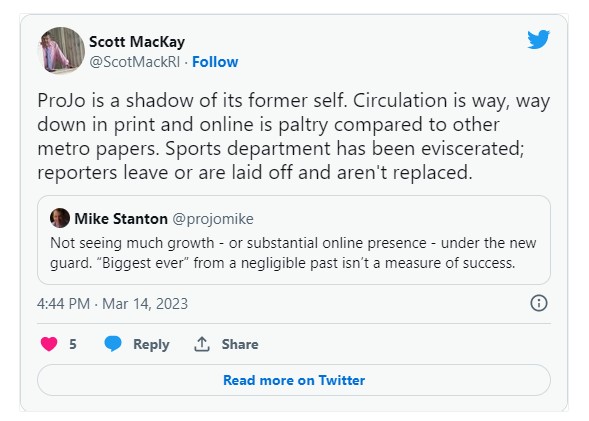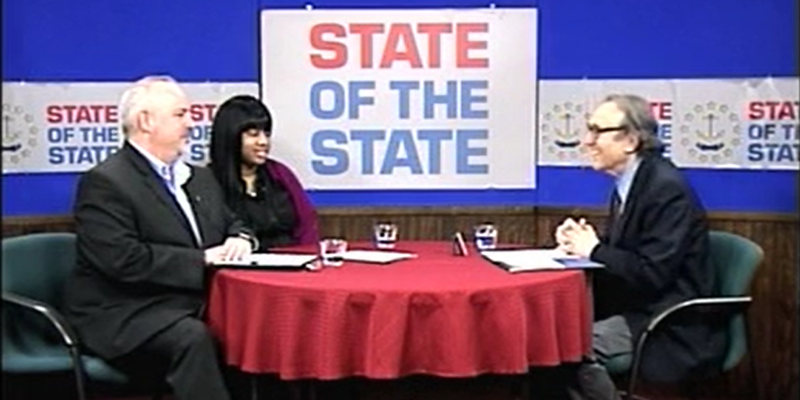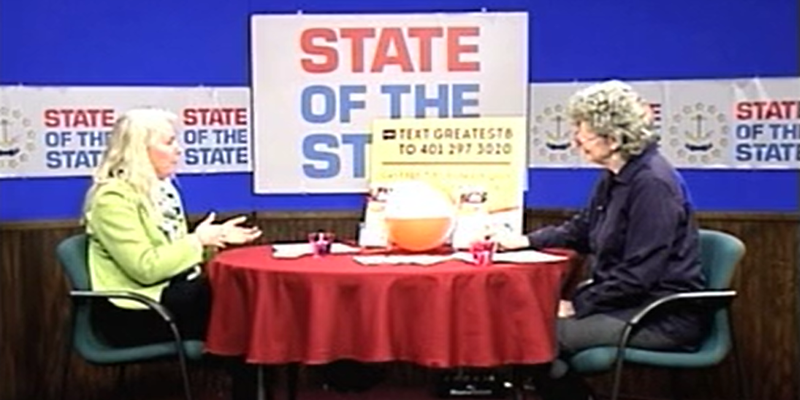It’s interesting to watch these partisan ideologues bash the newspaper that contributed so much to their careers. One wonders whether they’ve ever considered whether their work-product and the journalistic culture they’ve perpetuated has contributed to the paper’s plight:

Now that it is no-longer-proposed, we are free to look at Fane Tower renderings in detail, beyond the gut reaction that it is odd and would be misplaced in Providence. Structurally, the building would have been akin to a tree trunk that began to split near the ground. The strength comes from the middle, providing the support for the flaring ends. Rhode Islanders should contemplate the visual metaphor.
Years ago, I came to the conclusion that the problem with U.S. politics and governance is not that it’s too conservative or too progressive, but that our system was no longer extracting the best from each impulse. A contingent that insists that we keep moving is valuable, and a contingent that insists on slowing down so as to preserve what is important is also valuable. As we become more divided, culturally, we’re losing the central support to make these tendencies better together than separate.
Rhode Island’s peculiar trait appears to be marrying this division within the same movements and individuals. We have progressives who don’t want anything to change — at least anything that’s important to their day-to-day lives. They’ll champion the continuing cultural revolution in which they can partake only as a matter of fashion, but when it comes down to it, they want the capital’s skyline to remain locked in time. They want jobs for workers and housing for low-income families, but they don’t want anything that is distinctly a business change their view as they drive home.
On the level of special interests, the situation is arguably worse. We’ve got the NIMBYs, to be sure, who insist that things should change but “not in my back yard,” but we’ve also got the radical progressives whose demand is that all changes serve their narrow ideology. On the other hand, the state has no business interests to speak of to offset these groups, all of them having been absorbed by the fundamentally corrupt government-insider gang whose interest is not business or development per se, but only that they be able to take a cut of whatever does happen to happen.
In a culturally homogenous society, the culture could provide the ballast to keep these factions from tipping the boat. In a diverse state, the political system could play a similar role by making it in politicians’ interest to triangulate. When the self-serving interests of those politicians represent the only “conservative” impulse, however — that is, the only restraint on radical change is that they must be able to profit from it — the system falls apart.
With the Fane Tower project killed off, the Pawtucket soccer stadium on the ropes, and the Superman Building project groaning under its own weight, we may be seeing the tipping collapse of the edifice that allowed insiders to pretend things were fine as the federal government kept money flowing after the real estate bubble popped and then COVID saved the state government’s fiscal neck. As the illusion crumbles, Rhode Islanders need to find our center, and we can only hope its foundation is still intact.
[Open full post]Guests: Jim Palmisciano and Sarah R, Forward Party members, https://www.forwardparty.com.rhode_island
Host: John Carlevale
Description: From time to time a third party movement emerges at the national and/or state level. The reasons for this are discussed. The National Forward Party asserts that it “is fighting for the American people with practical, common-sense solutions. While other political parties look to divide America into different camps, the Forward Party aims to bring them together.” It further describes itself as “not left, not right, FORWARD.” Guests describe their local RI focus: Rank Choice Voting; redistricting; ballot access; bringing people together to work on common solutions; and more.
On WNRI 1380 AM/95.1 FM, John DePetro and Justin Katz discuss:
- The Speaker’s revealing exit from the CD1 race
- Magaziner’s puppet show for coffeehouse unionization (as the puppet)
- Bureaucrats’ vulnerability to non-credible businesses
- McKee’s reckless spending on government raises
- Neronha’s flip-flop between partisan and responsible lawman
- Laffey’s curious presidential run
Featured image from Shutterstock.
[Open full post]Guest: Ellen Schroeder, PhD, URI
Guest Host: Susan Orban, Washington County Coalition for Children
Description: The Greatest 8 project is geared to helping parents to help their young children develop mental wellness skills at an early age. This is a skill set that is functional throughout the life cycle. The eight skills are foundational and are a valuable guide in helping parents, teachers and others who care for and work with children to help them promote mental health in children for life. Visit www.thegreatest8.org for more information.
And we definitely should not understand the alternative to be aggression and disregard of others’ humanity. Still, we have to recognize that it will not stop with the cause of the day. Just as it did not stop with same-sex marriage, it will not stop with the trans demands. Similarly, it did not stop when America proved it would put a black man in the White House (why wouldn’t we?), but instead, the racial activists upped their demands and sowed greater division.
On this or that issue, there may be good reasons to accept particular policies, but we have to recognize that it will not stop there, and we’ve very nearly given up our senses of both reality and identity as a nation — which was a shared sense that strove for freedom, no matter what the radicals say.
[Open full post]Woke is a parasitic derivative of Marxism providing cover for dishonesty with the claim that reality is subjective and aggression with the weaponization victim status and the psychological instability of its adherents. Its purpose is to destabilize our civilization under the theory that a perpetual revolution will somehow boil away the imperfections of society, leaving a communist ideal.
Of course, one complication in defining it is that most woke people lack the historical and philosophical background and self-awareness to understand what they’re doing and are being manipulated by those who do, who have no problem lying as a route to power.
[Open full post]We’re probably all feeling the increasing (let’s say) incoherence of things over the past decade or more, but I’ve found it clarifying. Distinctions and beliefs have reached cartoonish levels, which teaches lessons that may continue to apply in subtler degree when (if) life moves back toward sanity.
One may long have suspected that progressives (once, “liberals”) argued in bad faith. Take Rod Dreher’s “Law of Merited Implausibility,” which lampoons the Left as stating, “That will never happen, and when it does, you bigots will deserve it.” (James Lindsay’s “Iron Law of Woke Projection” is a stronger variation for our times.) The lesson that can’t really be denied is that logic, honesty, and factualism are not priorities for progressives. They derive from Marxism, so only power matters. All other values must serve power.
As much as it may be a partial cause of modern lunacy, social media also makes it more apparent. Thus, on Sunday, progressive Democrat Jennifer Volpe Douglas (multiple-time candidate for state senate) took an implied shot at her local opponent while retweeting this:

Somebody tweeting as “Center for Understanding” replied to Volpe Douglas, “She may have been 14 or younger when they first had sex, depending on her birthday.” (Of course, unstated is that the boy could have been 16 or younger and their ages may not be very far part.)
Now, move one space forward on the calendar from Volpe Douglas’s tweet to consider this from Planned Parenthood of Southern New England on Monday:

Even those who consider Planned Parenthood to be a helpful, moral organization should take a few minutes to read the letter. The girl in the story had an abortion at 13, wasn’t sure who the father was (presumably because there were so many possibilities), and says she likes sex too much to slow down. Planned Parenthood SNE says, “Cha-ching!” and “How dare Dear Abby tell her she needs a strong relationship with her mother?” The truly appalling thing is that Abby spent most of her response telling the girl to hurry to the nearest Planned Parenthood! Even that wasn’t enough.
How insanely radical (or radically insane) does an organization have to be to attack its boosters if they mention that young teenage girls should seek the support and guidance of their mothers in addition to subjecting themselves to the organization’s influence? Personally, I’d put this on the level of evil comparable to Pleasure Island in Pinnochio, but oughtn’t it at least discomfit mainstream Democrats… at least a little? Yet, one hears no expression of hesitance.
So, we can see clearly that, when it comes right down to it, the likes of Volpe Douglas and her co-partisans really don’t care about standards for appropriate sexual conduct among kids. Sometimes, it serves the purpose of their power to sneer and snicker at women for the exploits of their sons, and sometimes the same purpose calls on them to turn away from the self-serving monstrousness of abortionists.
Featured image by Iluha Zavaleh on Unsplash.
[Open full post]On WNRI 1380 AM/95.1 FM, John DePetro and Justin Katz discuss:
- The meaning of education legislation
- The message of the Fane Tower collapse
- The signification of voting bills
- The significance of Matos’s declaration for Congress
- The statement of media ignoring Nicole Solas
Featured image by Hugo Jehane on Unsplash.
[Open full post]Guest: Gregg Amore, Secretary of State, www.sos.ri.gov
Host: Darlene D’Arezzo
Description: Secretary Amore offers an overview of the areas he has begun working on. These include elections, specifically voter registration and preparation for elections; business regulation; State records and archives; State library; enhancing the civics education function. He acknowledged being an advocate for same day voter registration at the state level as it is permitted for presidential elections. Voter registration has undergone a cleanup in removing 60 thousand inactive voters. Rank choice voting; civics curriculum; enhancing business services; building a State Archives facility were also spoken about.









